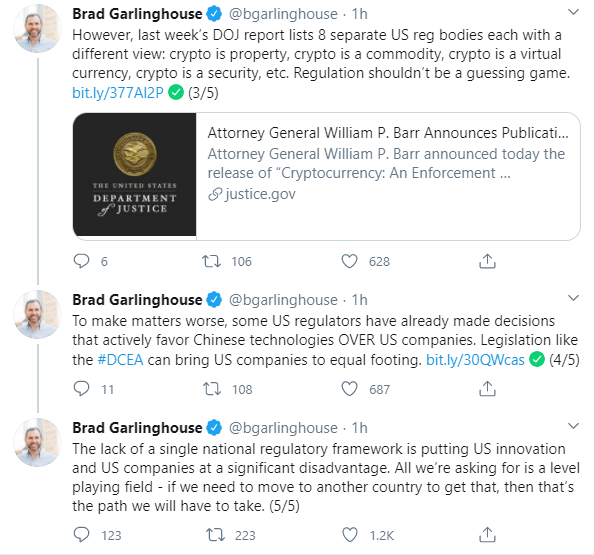Ripple chief Brad Garlinghouse has expounded on an earlier message about the blockchain startup’s future as a U.S.-domiciled company.
Cryptocurrency-related companies face a conundrum as they attempt to navigate a regulatory landscape that remains mired in uncertainty.
Garlinghouse took to Twitter to relay his message, acknowledging once again that the company is exploring its options. He also used the soapbox to clarify some of the misconceptions that might be swirling around.
First and foremost, Garlinghouse maintained that Ripple remains a U.S.-based entity that “abides by and supports critical laws,” including the Bank Secrecy Act and anti-money laundering protocols. He made one thing clear,
“We are NOT looking to evade U.S. regulation.”
Lots of speculation last week as Team @Ripple considers some very important decisions about our future. I want to clarify a couple of things related to some of what I read. (1/5)
— Brad Garlinghouse (@bgarlinghouse) October 12, 2020
Ripple: Help Us Help You
Yet, Ripple finds itself between the same rock and a hard place that so many U.S.-based blockchain startups are facing these days, one in which the regulatory climate is lacking. Companies are held responsible for the rules that relate to existing regulations even though they aren’t sure where they fall in. For example, in a recent interview on the Coinscrum podcast, Sadie Raney, COO of Strix Leviathan, harkened back to Satoshi Dice, a blockchain-based gambling app. In 2014, it was charged by the U.S. Securities and Exchange Commission for offering shares that could be purchased via bitcoin without registering them. Even though Satoshi Dice eventually blocked U.S. IPs, it wasn’t enough. Raney explained,“The SEC fined them and went after them for securities violations, which leads to another issue with our industry, is that regulators can double down on you. They can penalize you for not registering, but then they can also penalize you for violating the regulations that applied to the registration that you didn’t get. It doesn’t even have to be digital-asset specific. They can decide that retroactively, which is really hard from our standpoint…It stifles innovation in this space quite a bit.”
Patchwork Regulation
Garlinghouse bemoaned a patchwork regulatory landscape, on which numerous U.S. regulatory bodies each have their own take on the classification of crypto, albeit property, a commodity, a virtual currency, security, etc. He said, “Regulation shouldn’t be a guessing game.”

Disclaimer
In adherence to the Trust Project guidelines, BeInCrypto is committed to unbiased, transparent reporting. This news article aims to provide accurate, timely information. However, readers are advised to verify facts independently and consult with a professional before making any decisions based on this content. Please note that our Terms and Conditions, Privacy Policy, and Disclaimers have been updated.
Gerelyn Terzo
Gerelyn caught wind of bitcoin in mid-2017, and after becoming smitten by the peer-to-peer nature of crypto has never looked back. She has been covering the space ever since. Previously, she wrote about traditional financial services, Wall Street and institutional investing for much of her career. Gerelyn resides in Verona, N.J., just a hop, skip and a jump from New York City.
Gerelyn caught wind of bitcoin in mid-2017, and after becoming smitten by the peer-to-peer nature of crypto has never looked back. She has been covering the space ever since. Previously, she wrote about traditional financial services, Wall Street and institutional investing for much of her career. Gerelyn resides in Verona, N.J., just a hop, skip and a jump from New York City.
READ FULL BIO
Sponsored
Sponsored
